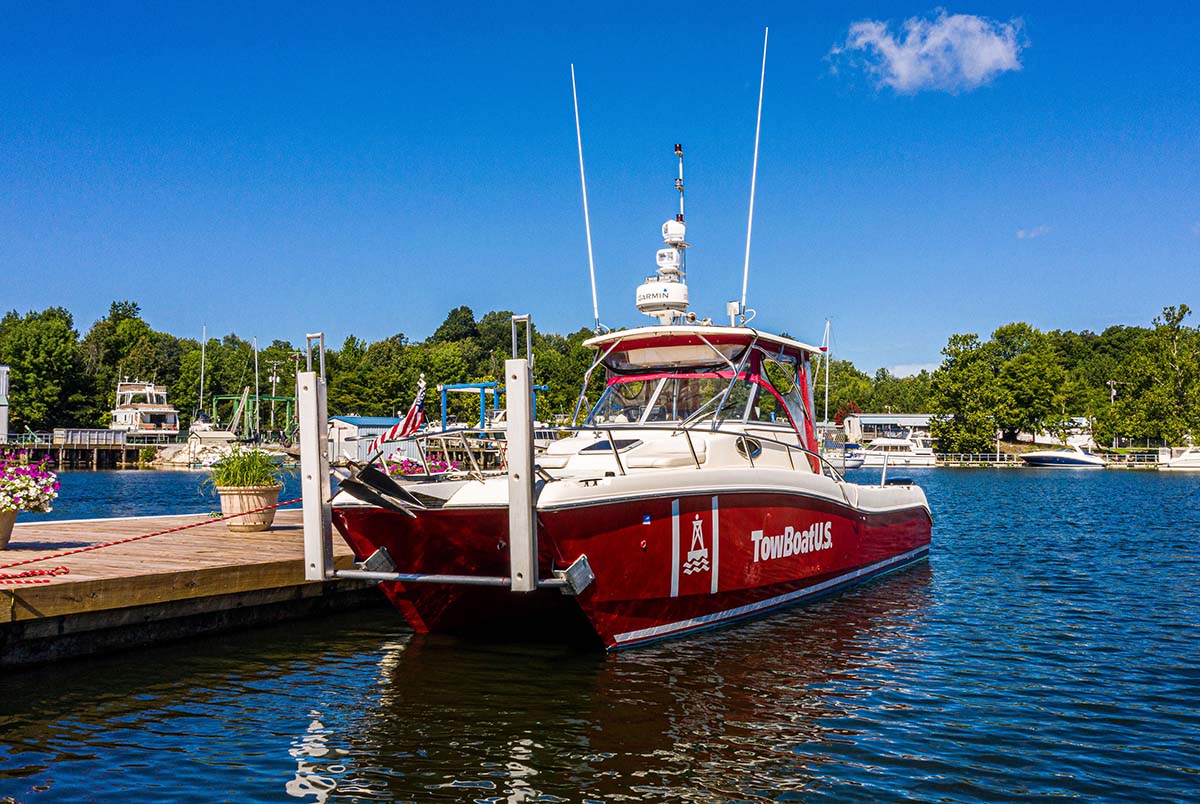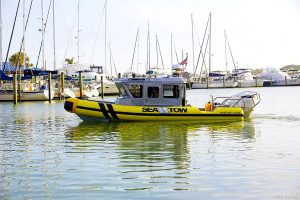
Marinas and Boaters Find Value in the Towing Business
Published on August 21, 2024A tow boat can be a boater’s best friend when a day on the water takes an unexpected turn. That friendship can expand into a long-term relationship if that tow boat is housed at a marina, with both the boater and facility reaping the benefits. Whether a marina manages the tow boat operation or leases slips to a tow boat operator, having a towing service on site can be a valuable profit center.
TowBoatUs and SeaTow are the leading towing operations plying all the waters of the United States, and both rely on a fleet of boats and captains to help boaters in need. In many instances, those fleets are homeported at local marinas.
Towing for Profit
Joseph Frohnhoefer, Sea Tow CEO, said a towing business located at a marina not only affords extra income from the tows, but it completes what he calls the circle of communication, allowing boaters to be connected to service both landside and at sea. Having the ability to have a boat towed back to its homeport and serviced in that same familiar location is an added peace of mind that boaters are willing to pay for. A towboat operation on-site is a selling point for any marina.

David Granstaff, general manager of Green Turtle Bay Resort and Marina in Kentucky, has been a TowBoatUS operator since 2019 after leaving the corporate world. He has one boat, and one of the captains who works at the marina has his own boat. Granstaff said he makes the call on which boat will go out, but they split the commissions. With three captains employed by the marina and a backup captain who lives nearby, there is always someone ready to go out on a call.
The marina is full service, so he can keep his captains working year-round with the towing part of their job and have an additional profit center. “Our customers love the fact that we’re here. There’s security that if they have an engine failure or grounding, we’re always within about two hours,” Granstaff said. He estimates that the service averages four to five calls per week during the boating season. “We’re a one-stop shop. We get the call, make the repair and send the boat back out on the water. We have many TowBoatUS members, but all the insurance companies know us well for the boats we help that don’t have that membership,” he said.
Matthew Kronen, owner of Coosa Island Marina in Alabama, is new to towing, having just opened his operation in 2023, but he said he already sees the benefits. “This has been an incubator to expand our presence on the water and boost our credibility,” he said. While the marina has been in his family since 1983, it had ceased operations until he bought it eight years ago and rebuilt it.
Located on a private island on a landlocked lake in remote Alabama, the added recognition has been beneficial. “I like positive publicity. No one is ever mad to see the tow boat. It’s great having it there to help our customers. They get a membership often right when they get a slip,” he said.
The marina has two tow boats operating, and Kronen has plans for a third as a new port is opening nearby. The biggest challenge he encounters is towing boats that are not members and don’t have insurance. “We have a lot of people who assume we’re a free service. Those are difficult phone calls. If you don’t have insurance and no membership, we have a minimum charge to make this make sense. We always try to work something out and not leave someone stranded,” Kronen said.
Starting a Towing Business
Both SeaTow and TowBoatUS have the same goal of assisting boaters in need every day and every hour of the year, and both have carried positive reputations for decades. According to figures from BoatUS, 113,632 calls for assistance came into the service over the past year. Of those calls, 54% were in response to mechanical breakdowns, with the remainder being for groundings, battery or electrical issues and engine overheating.
Marinas that want to have a towing operation on site need captains, a boat and, on average, a $1 million insurance liability policy. They also must meet the federal requirements for licensed captains, which includes regular drug screening. “Captains work in the corporate or marine world, they’re tug boat operators, six-pack guides. Our captains run the gamut. Other than boating experience, which makes their job easier, we’ll talk to anyone interested,” said Chris Dolan, TowBoatUS partner relations manager.
The number of boats and captains varies with need, with the only stipulation that a stranded boater can call and get assistance 24/7 365 days of the year. Towing non-members is part of the agreement captains make with the towing organizations. On a small lake, one man and one boat may cover it, while larger areas may need a fleet of tow boats and several captains.
TowBoatUS operators run their own business, getting paid from the time they leave the dock on a call to the time they return. “An average tow costs $1,060 and that’s what our towers will get. Through the BoatUS app, we dispatch for them, and we direct bill, so the customer doesn’t interact with the tower on fees. The tower just inputs their hours for each tow, and the money is direct deposited. You do the tow, you get the dough,” Dolan said.
They also are paid a commission for the sale of memberships to their local boaters. TowBoatUS operators are partners with a licensed agreement to use the TowBoatUS brand. The company markets the business nationally and provides financial assistance for the operators to market locally.
SeaTow operators are paid regularly through a membership percentage, meaning whether they are on the water or not there is an income coming in. For SeaTow operators, the stranded boater or the insurance company pays the tower directly. They are franchises that benefit from adding SeaTow members from their communities.
There is no continuing education or training requirement by either SeaTow or TowBoatUS, but both encourage it by providing interoperation communication. TowBoatUS encourages its operators to get involved with C-port by reimbursing the membership dues. C-port is the industry association for on-water towing and salvage. “We’re big supporters of their mission. They have industry experts to talk about the technical stuff that happens on the water, and they offer risk management courses that we also reimburse our members for. They have online case studies and new equipment highlights, and they just set the standards for towing,” Dolan said.
Tow boat operators often set up their own training. Granstaff said he conducts in-house training with his captains a few times each year. “We talk about our unusual calls and what we could do better. We do a risk assessment based on information we get back from the boaters we’ve responded to,” he said.
Towers do not compete as both companies are careful to bring aboard towers not in areas where others already exist. The marketing potential is high if a marina has the only tower in the area. Every towed boat is a potential customer. TowBoatUS has 321 separate towing locations across the country, while SeaTow is operating 110. Both are continually expanding.
| Categories | |
| Tags |





